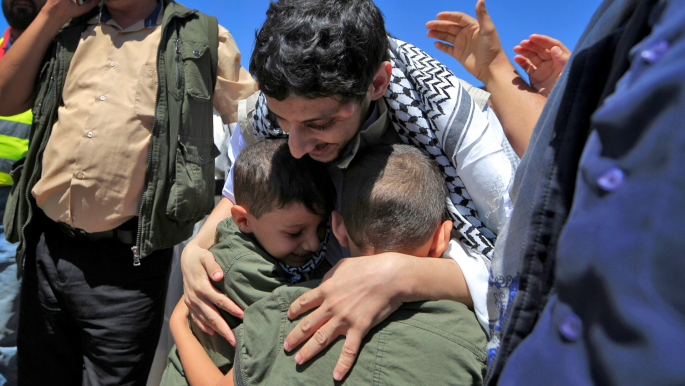Yemen in Focus: New Houthi ambassador reflects Iran's deepening influence
"The Iranian regime smuggled Hassan Irloo, an IRGC member tied to Lebanese Hizballah, into Yemen under the guise of 'Ambassador' to the Houthi militia," US State Department Spokesperson Morgan Ortagus said in a tweet.
"Iran's intent to use the Houthis to expand its malign influence is clear. The Yemeni people should say no to Irloo and Iran," the spokesperson added.
The remarks came after the Iranian foreign ministry last week said Irloo, "ambassador for the Islamic Republic of Iran in Yemen, has arrived in Sanaa."
"He has presented his letters of credentials to Mehdi al-Mashat, head of Yemen's supreme political council," he added, referring to an executive body formed by the Houthi rebels.
The move sparked outrage in Yemen and prompted the internationally-recognised government, which was forced out of the capital after a rebel coup in 2014, to submit a formal complaint to the United Nations' Security Council on Monday.
 |
Iran's intent to use the Houthis to expand its malign influence is clear. The Yemeni people should say no to Irloo and Iran |  |
"The action constitutes a breach of Iran's international obligations under the United Nations charter, the Vienna Conventions on the Diplomatic Consular Relationship and Security Council resolutions," the complaint said.
"It constitutes dangerous precedents that affect the essence of the rights of members states of the United Nations and allows rogue states and regime to enable rebels to violate state sovereignty," the statement added.
Any actions issued in Yemen's name by the "occupied embassy" in Tehran are considered null, the statement warned.
So far, Iran, which backs the Houthis in Yemen's civil war against the Saudi-backed government, is the only country to hold diplomatic relations with the Houthis.
Twitter Post
|
Fars news agency did not specify when or how the ambassador had reached Sanaa, but the announcement came shortly after more than 1,000 prisoners were freed in a landmark exchange between the warring sides in Yemen.
Details surrounding his successful entrance into Yemen sparked outrage among senior political officials as well as Yemen watchers, with the office of the Special Envoy for Yemen Martin Griffiths issuing a statement to deny any involvement in the transfer of Hassan Irloo into the capital.
Meanwhile, analysts warn the planting of a senior IRGC official in Yemen reflects deepening Iranian influence in Yemen.
"The Iranian press has previously devoted considerable attention to the Irloo family due to their strong ties to the Iranian Islamic Revolution and its military wing. In 2013, when Irloo's mother died, Qassem Soleimani himself attended the funeral to honour her as the mother of two martyrs - Hussein and Asghar - who were killed in the Iran-Iraq War," Mohammed Albasha of the research firm Navanti Group told The New Arab.
"The smuggling of an enigmatic figure with close familial ties to the Islamic Revolutionary Guard Corps into Houthi territory under the guise of diplomacy reinforces the primacy of Yemen within Iran's regional 'axis of resistance' framework, and demonstrates that Iran has no intention of disengaging from Yemen in the near future," Albasha added.
Yemen's internationally-recognised government has long accused the Houthis of receiving support from Saudi Arabia's regional arch enemy Iran, in a bid to "destabilise" the region and country.
 |
The smuggling of an enigmatic figure with close familial ties to the IRGC into Houthi territory under the guise of diplomacy reinforces the primacy of Yemen within Iran's regional 'axis of resistance' |  |
Saudi Arabia, Yemen and the United States have also accused Iran of providing weapons as well as military expertise to assist the rebels in developing missiles that have for years rained on the neighbouring kingdom. Iran has long-insisted on denying claims it is supporting the rebels in Yemen with weapons.
But earlier this year, a member of the Houthis' political council said the rebel group benefits from neighbouring Arab and Muslim relations, including Iraq, Iran and Oman, admitting to long-rumoured ties with the Islamic Republic.
The rebels are benefiting from relations with these countries amid ongoing "aggression", Abdul-Malik Alejri, a member of the Houthi political council said, referring to the conflict with Saudi Arabia, the UAE and their allies.
 |
|
| Read more: Yemen in Focus: Prisoner release a 'moment of joy' after years of misery |
"We do not deny that the authority of Sanaa and Ansar Allah has relations and contacts with Iran, Oman, Iraq and other Arab and Islamic countries," Alejri said on Twitter, referring to the rebel's official political party name.
These relations are "natural, which we should not be ashamed of, based on our vision of establishing positive relations between Yemen and the surrounding Arab and Islamic countries, especially the neighbouring countries, except those who refuse", he added.
"We are taking advantage of this relationship to push aggression against our country," he said, referring to the military operations of Saudi-led coalition, which has been battling the rebels in Yemen since 2015.
The military intervention has so far led to more than 100,000 being killed and millions to suffer food shortages, in what the United Nations calls the world's worst humanitarian crisis.
As the war approaches its sixth year, Yemenis have called for a peaceful resolution to the conflict and have condemned the use of the country as a mere "battleground" for regional enemies to settle scores.
Yemen In Focus is a regular feature from The New Arab.
Sana Uqba is a journalist at The New Arab.
Follow her on Twitter: @Sanasiino





 Follow the Middle East's top stories in English at The New Arab on Google News
Follow the Middle East's top stories in English at The New Arab on Google News


